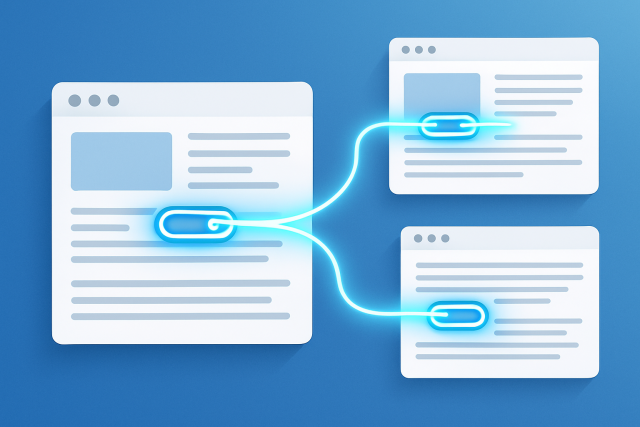
Most Effective Link Building Tactics for eCommerce Brands
Learn practical, step-by-step link building tactics tailored for ecommerce brands. Boost your search...

Contextual link building plays a starring role in today’s SEO landscape by focusing on backlinks naturally woven into relevant content and boosting a website’s authority and search rankings in an organic way. Unlike generic backlinks these gems create meaningful connections that search engines trust much more. Using Moz tools switches things up and gives SEO pros a treasure trove of detailed data insights, competitor analysis and solid authority metrics.
This guide dives into contextual link building by walking you through the basics and spotlighting key strategy elements. It also offers practical steps using Moz tools. We will help you uncover link opportunities and craft content that naturally draws links in. You will learn how to execute outreach that is tailored just right and keep an eye on your link health.
Contextual link building is all about snagging backlinks that slide seamlessly into the main content of a related page and bring actual value rather than tossing in a bland generic mention. Search engines seem to have a soft spot for these contextually relevant links because they hint at genuine trust and a solid topical connection between the linked pages.
Contextual link building is a key piece of the link building puzzle where quality takes the spotlight over sheer numbers. Since Google’s algorithms lean heavily on relevance and user intent these links usually give your rankings a more lasting lift by showcasing real content authority, trustworthiness and expertise in a particular niche.
Seek out relevant and trustworthy websites in your niche that naturally jive with your content and audience—think of it like finding new friends who get what you’re all about.
Create top-notch link-worthy content such as detailed guides, original research or expert insights that others can’t help but reference.
Take a peek at your competitors’ backlinks to uncover tried and true link opportunities and spot the content themes that really resonate.
Reach out with the goal of building genuine relationships and arrange for contextual links nestled within valuable content—no spammy hustle here.
Keep a regular eye on your acquired links to make sure they stay high-quality and relevant and steer clear of any pesky penalties or spam flags.
Each part plays a important role in building a natural and trustworthy backlink profile. When you zero in on relevance and quality while picking sites and crafting content—paired with focused outreach and steady management—you’re setting yourself up for a backlink strategy that’s not only solid today but also stands firm against algorithm tweaks.
Moz offers a solid lineup of SEO tools aimed at covering every angle of contextual link building. Take Link Explorer for instance—it’s great for digging into backlink profiles without breaking a sweat. Then there’s Moz Pro Campaigns, which lets you roll up your sleeves and get down to the nitty-gritty of SEO management.
Dig into backlink profiles, uncover those hidden link gems, and keep tabs on link metrics to supercharge your website’s authority and climb those search rankings.
Pinpoint high-performing keywords, size up the competition, and discover fresh SEO opportunities so you can zero in on the search terms that really count.
Run a full-body scan of your site to sniff out SEO hiccups like broken links, crawl errors, and optimization gaps—complete with hands-on recommendations to boost your site’s health.
Stay on top of keyword rankings over time, measure yourself against competitors, and evaluate SEO campaign wins and losses with real-time data you can trust.
Delivers in-depth backlink analysis featuring key metrics like Domain Authority, Page Authority, and spam score, so you can judge link quality and dodge potential pitfalls.
Boasts an intuitive layout and smooth navigation that make complicated SEO data and tools feel less like rocket science—helpful for users of all experience levels diving into advanced link building.
Offers a range of subscription options (Standard, Medium, Premium) tailored to businesses of all stripes, so you get just the right features without paying for extras you don’t need.
Keeps evolving with the times by rolling out improvements that align with the latest SEO trends, algorithm shifts, and valuable user feedback.
Metrics like Moz’s Domain Authority are a handy compass for marketers and help them zero in on link opportunities from sites that genuinely move the SEO needle. Meanwhile, Spam Score is a trusty red flag that warns when a site could be risky. When you combine these insights with a good look at anchor text and watch what competitors are doing, you get a smart and focused link-building approach.
Start off with Moz Link Explorer to uncover those authoritative websites that are crucial in your niche. I have found this tool incredibly handy for sifting through potential link sources with a fine-toothed comb, ensuring your contextual links aren’t just a flash in the pan but stick around and pack a punch.

Screenshot of Moz Link Explorer highlighting backlink data and Domain Authority scores
After you have pinpointed potential sites it’s key to craft content that smoothly weaves in contextual links. Your content should genuinely offer real value within a relevant setting, lending a hand to organic backlinking.
Try using Moz Keyword Explorer to dig up the most relevant and high-impact keywords and topics to weave into your content.
Successful contextual link building often hinges on how thoughtfully you reach out. Moz’s insights give you the upper hand by letting you tailor your messages to truly resonate and show you understand the target site’s authority, audience and content gaps.
Once you have nailed down those contextual links it is smart to keep tabs on them to safeguard your backlink profile's health. I have found Moz tools handy for tracking fresh links and checking their quality over time. They also help catch any toxic or lost backlinks that might sneak in.
Mangools serves up a popular budget-friendly alternative to Moz and packs an easy-to-use SEO suite loaded with must-have backlink analysis and keyword research tools. It’s a solid pick for beginners and small businesses who want straightforward link building without fuss. On the other hand, Moz shines with advanced metrics and in-depth data. It’s the go-to for those craving a deeper dive into link evaluation and strategic planning.
When you’re hunting for contextual link building tools, it’s super helpful to break down pricing, features, usability, and target users to see what really gels with your SEO goals.
| Comparison Points |  |  |
|---|---|---|
| Pricing | Standard $99, Medium $149, Premium $249 per month — a bit on the higher side, but packed with features. | Basic $29, Premium $39, Agency $79 per month — easy on the budget without skimping on essentials. |
| Key Features | Keyword research, site audits, link analysis, content optimization — pretty much the SEO essentials covered. | Keyword research, SERP analysis, backlink analysis, rank tracking — all the basics served up nicely. |
| Ease of Use | Takes a bit of time to get the hang of; best for users who already have some SEO know-how under their belts. | A straightforward interface that’s welcoming to newbies and still handy for seasoned users. |
| Target Audience | Digital marketers, SEO pros, and businesses of all shapes and sizes looking for a robust toolkit. | Perfect for marketers, SEO pros, bloggers, and website owners who need strong tools without the headache. |
| Integration Options | Offers somewhat limited integrations with external platforms — good, but not a perfect fit if you need a lot of connectivity. | Mostly standalone tools with limited integration — sometimes you have to take what you get. |
| Product Suite Variety | Includes Moz Pro, Moz Local, plus the handy MozBar browser extension for on-the-fly insights. | Covers the essentials with KWFinder, SERPChecker, and LinkMiner tools making up the core offering. |
| Pros | Comprehensive SEO tools, detailed analytics, and a solid reputation that’s stood the test of time. | Affordable, easy to navigate, a solid range of SEO tools, and they keep things fresh with frequent updates. |
| Cons | Pricey, with a steeper learning curve and fewer integration options than some might hope for. | Not quite as feature-rich as some competitors, has some data limits, and might overwhelm absolute beginners a bit. |
| Go to Moz Site | Go to Mangools Site |


Moz really shines with its Domain Authority metric, vast link databases and detailed spam risk assessments. It is a go-to for professional SEOs who crave precision and reliability. On the flip side, Mangools tends to keep things wallet-friendly and straightforward. That is why it’s a favorite among solo users and smaller teams who appreciate a smooth user experience and cost savings.
Some of the main challenges in contextual link building include hunting for quality prospects and dodging spammy or irrelevant links. It is also important to ensure the links stay relevant over time. Moz’s data-packed tools offer clear insights and practical metrics that take the guesswork out of these tasks.
"SEO is a constantly moving target, so leaning on detailed, data-backed tools like Moz can really tip the scales when it comes to mastering the art of contextual link building. These tools serve up the kind of insights that help pros craft authentic, effective backlinks in today’s ever-evolving and often tricky search landscape." – Sarah Mitchell, SEO Strategist
Set up your Moz Pro account and create campaigns to keep a solid watchful eye on your website’s SEO health and backlink profile from the start.
Dive into Moz Link Explorer to run initial backlink audits. It’s your best friend for getting the lay of the land and finding any toxic links.
Hunt down link gap opportunities by dissecting your competitors’ backlink profiles and intersect reports. This smart move often reveals hidden gold mines.
Craft engaging, truly link-worthy content fine-tuned with Moz Keyword Explorer to zero in on the keywords that matter.
Roll out targeted outreach fueled by Moz data, prioritizing sites with strong Domain Authority and the right contextual fit because relevance is king.
Keep a close eye on your link health and performance using Moz’s handy tools and be ready to tweak your strategy when the winds shift.
12 articles published
With over a decade of experience in data-driven marketing, Quentin Moreau is known for his analytical approach and innovative use of metrics to optimize online campaigns for maximum impact.
Read Pages
Learn practical, step-by-step link building tactics tailored for ecommerce brands. Boost your search...

Stay ahead in SEO with essential link building tips for 2025. Learn expert strategies and insider ha...

Unlock the power of contextual links with proven strategies that improve SEO rankings and user engag...

Stay ahead in SEO with powerful link building techniques in 2025. Learn expert tips and advanced str...